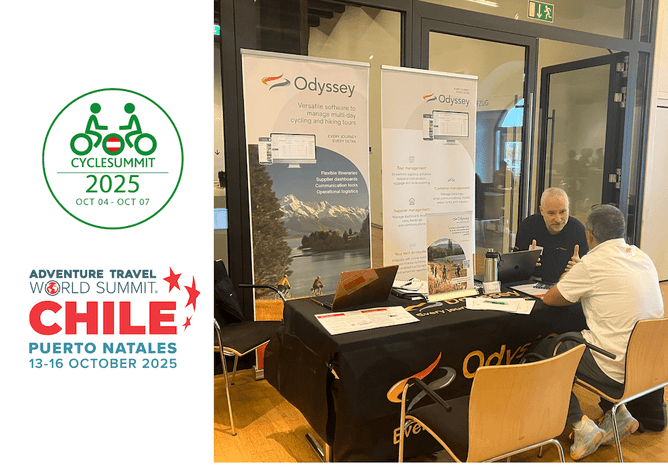We have come back from Cycle Summit and ATWS Chile with a notebook full of insights from some great conversations with operators of all sizes, from family-run cycling businesses to larger adventure brands. Everyone shared a similar theme, they see the need to work smarter, not just harder. With many feeling like their tech isn't fit-for-purpose and is limiting their current and future goals. While they aspire to change, there are some small internal roadblocks they need to navigate .
Instead of summarising what we think, here’s a look at what operators are asking and what we’re hearing in return.
Q: Are Operators still really using spreadsheets?
A: Yes. And for many small operators, they still “work” ... until they don’t.
Many operators we spoke to are managing bookings, rooming lists, and supplier details on spreadsheets or legacy systems that can’t scale. Some said their IT person is retiring, others are tied to systems built by third-party developers that don't know 'travel and tours'. And they are costly to maintain, hard to update, or connect to other tech.
Some are spending significant amounts building their own systems, but discovering they aren't complete eg "not having a Suppler CRM included is a pain"... there appears to be a disconnect between knowing what they want, and getting it.
We think there's a mental model that exists that 'our business is unique' so we need some unique tech e.g a custom built solution. The reality is most operators are managing customers, suppliers, tours and resource logistics through similar delivery models and processes.
Q: What are Operators most frustrated about with their current systems?
A: Disconnection.
There’s strong interest in having one source of truth a single data management platform and system where booking data flows naturally through tour design, customer and supplier communications, and into operational delivery.
Right now, most front-end tools don’t connect with back-end logistics. And most back end systems are a mix of multiple spreadsheets, or apps. Operators find it "frustrating to copy and paste data" between forms, itineraries, and supplier lists. So when teams hit 300+ customers per season, they are saying their "inefficiencies really start to become obvious".
Operators were very open about these pain points... double data entry, copy/paste for rooming lists in multiple versions, missed supplier updates, and a growing awareness that this equals inefficiencies, errors, ineffective supplier relationships and all of this runs the risk of a bad customer experience.
Q: So what does “better tech” look like to them?
A: It’s about connection, not complexity.
Operators told us they don’t want dozens of new apps... they much prefer one platform that fits the way they work.
That means:
Email templates for both customer and supplier communications journey
Online forms for suppliers and customers (reduce long email threads & manual entry)
Dietary needs, bike sizes and rooming lists in one document for guides and staff
The ability to send information directly to guides
Itineraries in different languages
Reporting that shows profitability margins, resource use or growth... not just numbers
Able to handle diverse products eg Group set departure, FIT, guided and self-guided or custom/bespoke itineraries
And lots of 'that's cool' moments for our luggage labels
And yes, they would love to ditch those 50-page PDF road books in favour of mobile itineraries with built-in mapping and navigation. While many Operators have a mapping application, they don't all use an itinerary app.
Q: AI adoption?
A: some easy wins, but some to hard to think about.
Surprisingly Ai didn't come up often from the Operators in our conversations. Yes there are some who have an interest in Ai generated itineraries, and one Operator is experimenting with some Ai technical coding.
Most of their staff are using Ai for basic prompt/response type work, But very few are active in building their own workflows or connecting systems. It seems that most don't have the time to get their head up from the day to day to be considering 'technical builds'.
At ATWS Jason Reckers led a presentation to Operators. An easy implementation of an Ai tool is having a chatbot at the front of their website to filter enquiries and support FAQ info. In the future these chatbots will have the ability to directly connect to other Ai systems to help 'make the sale'.
We heard smart conversations about AI policy e.g how to tell customers, 'we use AI responsibly. Your data is safe. Our images are authentic.' This is smart advice to ensure Operators build trust through transparency.
The other talking point is how Operators remain discoverable as search shifts from Google to Ai platforms. This is a bigger topic than this trade event report, but Operators should be thinking of data structure, the importance of clear and succinct content, FAQs in Q & A format, reviews and trusted references from 3rd parties, and as mentioned, start thinking about Ai policies.
Operators know they need to be thinking about data structures for Ai to 'connect' to their business, and most know the advantages of working with a tech company who are familiar with their travel sector. The real benefit this provides is a stepping stone into Ai by providing data integrity and workflow processes.
The Real Barriers
Q: What’s stopping Operators from making a change right now?
A: Two things: people and understanding the trade off's.
Change Management can be challenging, especially when teams are small and staff have been doing things the same way for years with familiar tools. There’s also financial inertia being tied to an existing system or not fully realising the cost of inefficiency, although from our conversations most Operators know the need is there, and understand their hidden costs with the status quo.
But most recognise the trade-off. They can either hire more people, or invest in smarter systems. As one operator said, “A new staff member can help, but good software is ten times more efficient. And I know the cost of wages”.
What's next
For many Operators they now enter their 'off season' which is time to take a break, review and reflect, repair and maintain and get set up for the next season ahead. And that means it's the perfect time to transition new tech into their business and teams.
Most Operators however will go back to the same systems and processes as before, and kick themselves as the new season begins that they didn't make a choice to invest in their business and their staff... so nothing will change.
Others will see the next phase of their business, have a clear plan in their head as to what their systems and process improvements need to be, and they will trust in a partnership with Odyssey to transform the way they work with customers and suppliers to be world class. Their team members will be happier, and they will either grow their business, or be more profitable.
We are grateful to have the opportunity to be members and supporting partners to Cycle Summit and ATWS. We hope this overview report helps Tour Operators realise they are not alone, but if they don't shift their 'tech' soon, they may well be as other Operators upgrade to more 'fit-for-purpose' systems.


